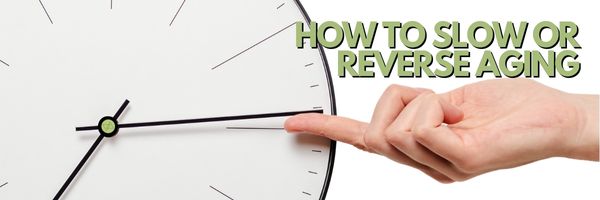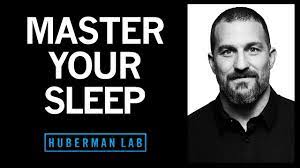
Now that we understand the biochemistry of aging on a cellular level and the role of our genome and epigenetics in that process, it’s time to focus on what we can do today for a younger tomorrow.
The good news is, longevity science provides us with actionable steps proven to reduce inflammaging and decay.
Nutrition, exercise, sleep, stress management, connection, purpose, and targeted supplementation are all ways we can mitigate the process of aging.
understanding longevity genes
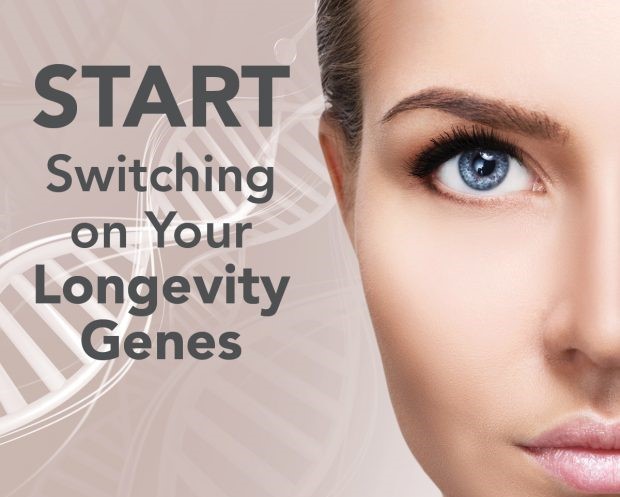
We know that our cells lose function as they age. DNA damage causes confusion in the cells. In other words, genes get turned on that shouldn’t and others are silenced when they should be active.
This process, called ex-differentiation, is believed to be the root of all aging.
Alzheimer’s is an example of DNA unspooling and ex-differentiation. Essentially the confused cell loses its identity. Diabetes is another example. Ex-differentiated cells can no longer get glucose out of the bloodstream into the cells for use. Excess glucose in the bloodstream binds to proteins and becomes caramelized, leading to high A1C levels, and stiffening of the blood vessels themselves.
Lifestyle choices (epigenetics), play a huge role in accelerating or slowing the aging process and cell ex-differentiation.

Longevity and Adversity
Calorie restriction and high-intensity interval training are two examples of what longevity scientists call “adversity mimetics.”
Lifestyle factors that mimick scarcity and survival trigger longevity gene pathways to slow or reverse aging.
Dr. David Sinclair, professor of genetics at Harvard University has found sirtuins—a group of seven longevity genes, are turned on by changes in lifestyle such as exercise and calorie restriction.
Sirtuins control a variety of protective processes including protecting chromosome integrity, stem cells from being lost, and cells from becoming toxic zombie cells.
Sirtuins can be activated by a lack of amino acids or of sugar, or through an increase in an important compound called NAD.
Sinclair found that NAD (nicotinamide adenine dinucleotide) a substance found in all living cells, could be used to mimic some of the same effects in humans that calorie restriction, scarcity, and other “adversity mimetics.”
Another name for adversity mimetics is hormesis. Hormesis triggers our longevity genes and biochemical survival circuitry.
So, what doesn’t kill us really can make us stronger.
Nutrition, fasting, exercise, hot and cold therapy, and targeted supplementation are some of the ways we can trigger hormesis.

nutrition
Michael Pollen said it best,
“Eat food. Mostly plants. Not too much.”
When scientists study the diets of the people living longest in the world, they found they ate a diet rich in plants, nuts, seeds, legumes, and whole grains. Dairy and animal products were only consumed sparingly and on special occasions.
Eating a plant-based Mediterranean Diet is recommended by most longevity researchers as the optimal nutritional anti-aging diet.
This “longevity diet” includes plants in the form of greens and herbs, legumes, fish, dairy from free-range animals, olive oil as the main source of fat, very little meat, and a bit of alcohol.
Scientists found that those who started eating healthier in their younger years could see a significant increase in their lifespan, especially by eating a Mediterranean diet.
Specifically, young American women who began the healthier diet at the age of 20 could expect to add ten years onto their life, while men of the same age could see their lives extended by 13 years.
But it wasn’t just young adults who could see longevity benefits from changing eating habits.
They also found that American women who adopted the diet at age 60 could see eight years added to their life, while men of the same age could see nine extra trips around the sun.

Even at age 80, both men and women could see up to 3.5 years extra of life by switching to a Mediterranean diet.
You’re on board but think you’ll miss your meat? Think again. Studies show that diets rich in animal products-especially processed red meats pose a high risk of cardiovascular disease and cancers.
Plants provide fewer amounts of amino acids than meat which induces good stress and our survival circuitry. Specifically, it inhibits mTOR, a longevity gene that reprograms cells to spend fewer resources on dividing and more resources repairing,
Personally, I eat a blend of the Mediterranean diet and the Pegan diet because gluten and dairy are inflammatory for my gut. Because we are all unique, I suggest you experiment with your own version of the Mediterranean diet to see what works best for you.
Intermittent fasting for longevity
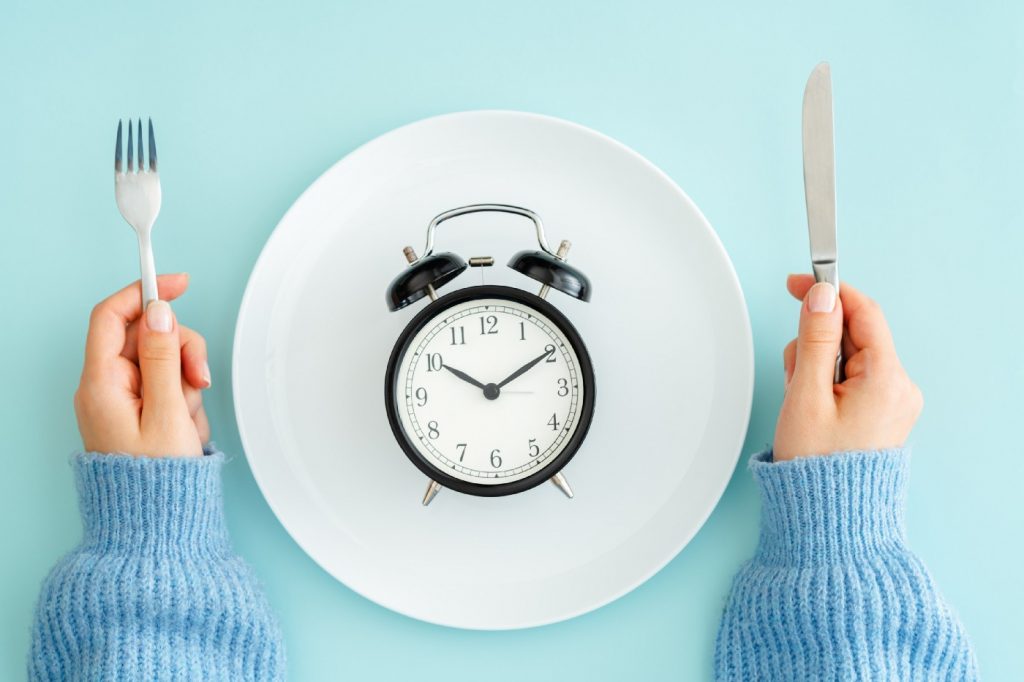
Fasting and calorie restriction are good for health and longevity. Studies conducted since the 1930s have shown that restricting calories- but not too much as to cause malnutrition- boosts the longevity of all life forms.
Fasting works because it provides just the right amount of stress to stimulate our survival circuits.
Hormesis stimulates longevity pathways to boost cellular defenses and minimize DNA damage.
But you don’t need to take on a strict life of calorie restriction to benefit; intermittent fasting has been shown to work even better.

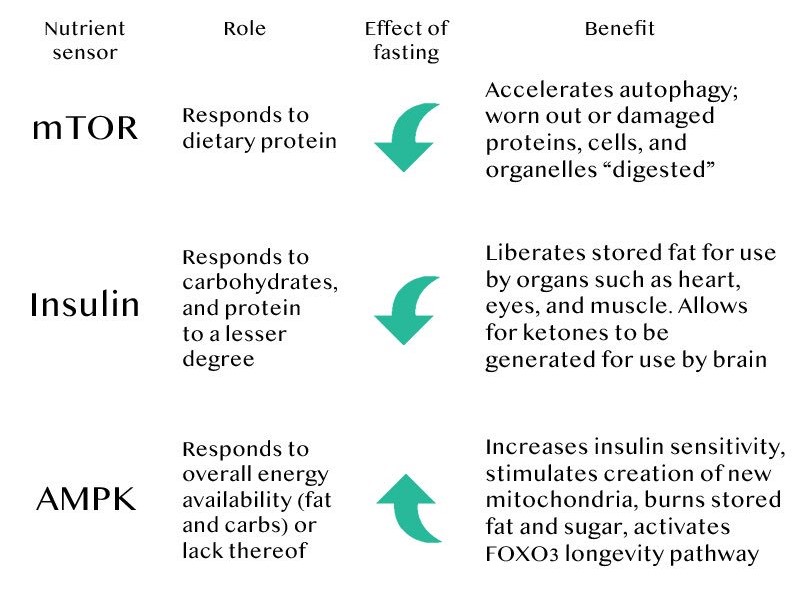
Studies show that participants who restricted calories through intermittent fasting triggered enough hormesis to result in lowered blood pressure and lower levels of a hormone called insulin-like growth factor 1 (IGF-1).
Reducing circulating IGF-1 and insulin levels and increasing, insulin sensitivity help to improve blood sugar stability and stress resistance to extend lifespan.
AMP-activated protein kinase (AMPK) is an enzyme that plays a role in cellular energy homeostasis. AMPK is activated when cellular energy is depleted through caloric restriction, intense exercise, and targeted supplementation.
When AMPK is lowered it helps cells become more sensitive to insulin, improves mitochondrial health, and helps burn stored fat for energy.
what is time restricted feeding
Fasting is catching a lot of attention lately due to the positive health benefits it helps. There are many ways to fast and you may want to do your own research in this area, but I am going to focus on a type of intermittent fasting called Time Restricted Eating (TRE).
TRE means consuming all your calories — whether from food or drink — within a specific time frame each day called the eating window.
Studies show time-restricted eating (TRE) increases lifespan while decreasing the incidence of major diseases, including cancer and cardiovascular disease.
Setting an eating window and sticking to it is one of the most important things you can do for health and longevity. This is because every time you eat — even just a bite of food — it triggers a process of digestion, absorption, and metabolism that takes hours to complete. And when your body is dedicated to processing food, it can’t also repair and restore.
Of course, the quality of your diet still matters, but the success of TRE lends credence to the idea that WHEN you eat is even more important than WHAT you eat.
Scientists say the minimum time you should go without consuming calories for TRE is 12 hours. For example, not eating anything from 8 pm the night before to 8 am the next morning.
While the science at 12 hours is impressive, lowering your window to as few as eight hours is significantly advantageous suggests Dr. Satchin Panda, arguably the world’s top expert on TRE. (Panda is a professor at the Salk Institute for Biological Studies and author of the book The Circadian Code.)
His research shows that the health benefits you get from eating within a 12-hour window double at 11 hours and double again at 10, and so on until you reach an eight-hour window. That would mean fasting for 16 hours and eating for the other 8 hours, or 16:8 TRE pattern.
“Eating late at night is by far the worst choice you can make,” says Panda. He advises giving yourself at least three hours between your last bite or sip and the time you go to sleep — eating your last meal around 6 or 7 p.m.
Your body needs that digestion time in order to have restorative sleep.
Panda personally adheres to an 11-hour TRE. He eats his first meal of the day around 8 a.m. and finishes dinner by 7 pm, which is several hours before his 10:30 pm. bedtime.
He acknowledges that not every day goes perfectly according to that schedule — but he does his best to stick to the routine. Even if he winds up eating a later dinner, he still tries to give his stomach at least 12 to 13 hours of rest before his next meal.
I use an app called ZERO to help me track my fasting and eating windows and cycle between 14:10, 16:8, and 18:6 fasting/eating windows throughout the week.
It’s not hard, I just try to eat earlier in the evening, don’t snack between meals, and don’t consume calories until after 11 or so.
I find I sleep better, have more energy, and am able to stimulate my metabolic pathways (mTor, IGF-1, and AMPK) for better health and longevity.
For me, the takeaway is clear: TRE is a simple tool available to everyone — and it doesn’t require any significant changes to what or how much you eat.
The best reason to shorten your eating window? It may, in turn, prolong your life.
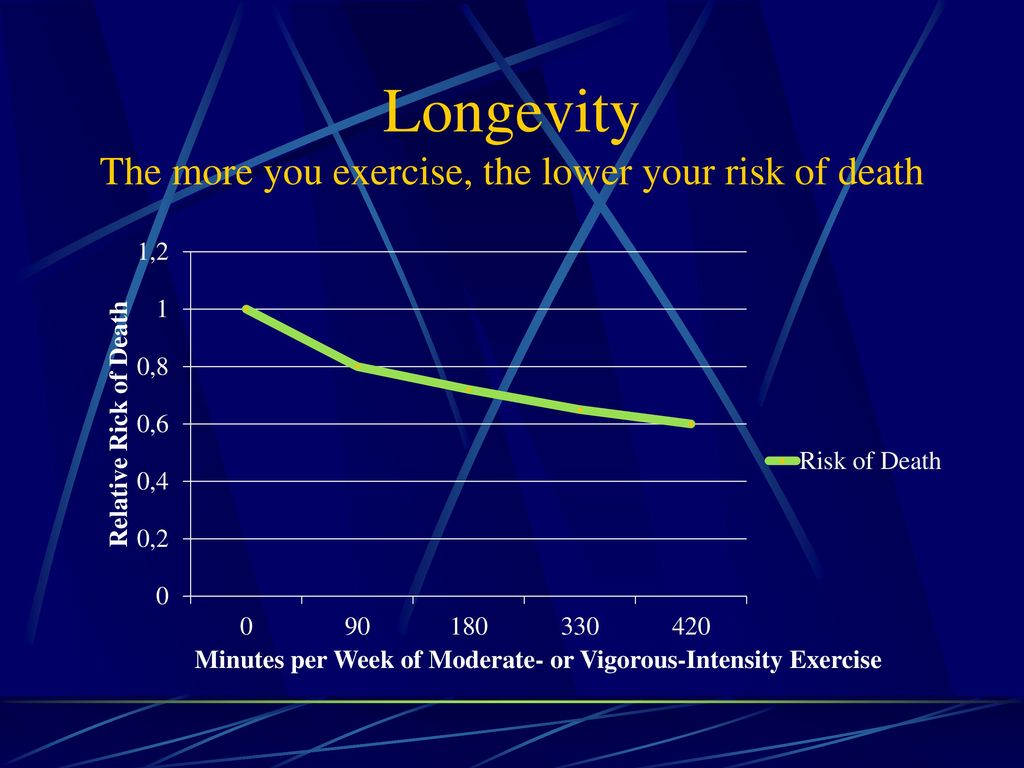
exercise and Longevity
We’ve talked about the benefits of pushing our bodies beyond our comfort zone to trigger hormesis and anti-aging.
Exercise is a classic example of hormesis — activating our longevity genes to help us become younger, stronger, and more resilient.
Exercise is one of the most important ways that you can extend your longevity.
Exercising—versus being inactive—can reduce your chance of dying from any cause by up to 35%.
Daily exercise can even help “turn back the clock” on some processes related to aging. It does this by helping you avoid certain diseases (such as heart disease and cancer) and optimizing your organs’ health.
But the longevity benefit is not just a result of reducing your risk of chronic disease.
There are actual cellular changes associated with regular exercise that keep you younger.
Researchers at Brigham Young University who studied the DNA of nearly 6,000 adults found that the telomeres, the end caps on chromosomes that shorten with age, were longer in people who were active compared to those who were sedentary.
This correlated to about a 9-year difference in cell aging between those who were active versus those who were inactive.
Another study compared the heart, lungs, and muscles of active 70-year-olds, inactive 70-year-olds, and active 40-year-olds.
They found that the active older men and women had comparable heart and lung capacity and muscle strength of those who were 30 years younger.
Unless there is a clear medical contraindication, we should all strive to achieve and maintain high levels of fitness.
There are lots of ways to get started but the easiest way is to start walking. All movement helps, but longevity scientist Dr. David Sinclair recommends getting in 10,000 steps a day if possible.
Walking after a meal is especially helpful for stabilizing blood glucose, and all muscle movement stimulates the production of new blood vessels, something we all need as we age.
For greater benefit, Dr. Sinclair recommends getting your heart rate and breathlessness up for 10 minutes per day.
Also known as “hypoxia,” high-intensity interval training turns on Hypoxia Inducible Factor 1-Alpha (HIF-1 Alpha), a pathway that turns on genes that increase our mitochondria.
The more mitochondria we have the more energy we produce and the more blood vessels we have to transport oxygen in our bodies (both of which decrease as we age.)
Current guidelines recommend 150 to 300 minutes per week of moderate aerobic activity (walking, running, swimming, biking), or 75 minutes of high-intensity activity, or a mix of both.
Twice-weekly resistance training to strengthen muscles and maintain hormone levels is also recommended.
Muscle mass decreases 1% per year as we age which not only affects our strength, but structural integrity, balance, metabolism, hormones, and risk for injury.
Lower intensity exercise like T’ai Chi, Yoga, and Pilates is also a great way to maintain flexibility, balance, and mind body connection,
Exercise also improves bone density. Since hip fractures have the same mortality rate as metastatic cancer, getting off the couch isn’t optional, but mandatory!

It’s never too late to start exercising.
Even if you have been sedentary for many years, it’s not too late to reap the benefits of exercise. Studies have found that people who are overweight or who have been inactive for years can increase their life expectancy by adding moderate physical activity to their routine.
And you don’t have to become an elite athlete to improve your longevity. Regular, moderate activities, such as brisk walking, have been associated with increasing life expectancy by several years.
For example, 150 minutes of exercise or more each week increased life expectancy by about 7 years over those who didn’t do regular moderate exercise. This benefit was seen regardless of weight, age, sex and health conditions.
“Insulin sensitivity is a hallmark of wellness. Keeping glucose out of the bloodstream, keeping low levels is a hallmark of wellness and longer life.”
– Dr. David Sinclair
Exercise and nutrition are the two biggest ways to impact blood sugar balance.
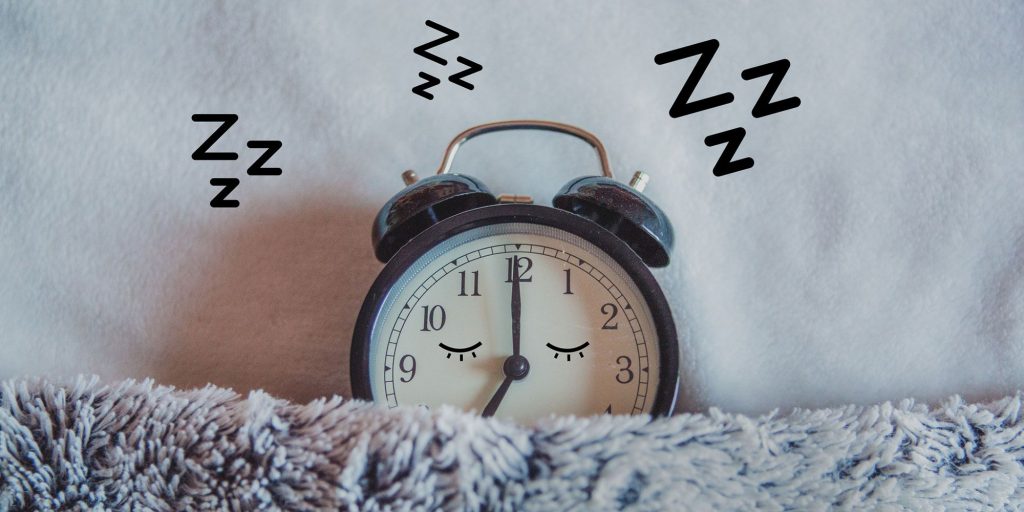
sleep and longevity
It can be tempting to trade sleep for a few precious hours of wakefulness, but it is important to consider the hidden costs. Sleep is precious, too.
Numerous studies have found that insufficient sleep increases a person’s risk of developing serious medical conditions, including obesity, diabetes, and cardiovascular disease.
Lack of adequate sleep over time has also been associated with a shortened lifespan.
An analysis of data from three separate studies suggests that sleeping five or fewer hours per night may increase mortality risk by as much as 15 percent.
One of the most important benefits of sleep is that it provides cells and tissues with the opportunity to recover from the wear and tear of daily life. Major restorative functions in the body such as tissue repair, muscle growth, and protein synthesis occur almost exclusively during sleep.
Insufficient sleep may cause health problems by altering levels of the hormones involved in such processes as metabolism, appetite regulation, and stress response.
Obesity—Several studies have linked insufficient sleep and weight gain. One study found that people who slept fewer than six hours per night on a regular basis were much more likely to have excess body weight, while people who slept an average of eight hours per night had the lowest relative body fat of the study group.
Another study found that babies who are “short sleepers” are much more likely to develop obesity later in childhood than those who sleep the recommended amount.
Diabetes—Studies have shown that people who reported sleeping fewer than five hours per night had a greatly increased risk of having or developing type 2 diabetes. Fortunately, studies have also found that improved sleep can positively influence blood sugar control and reduce the effects of type 2 diabetes.
Cardiovascular disease and hypertension—A recent study found that even modestly reduced sleep (six to seven hours per night) was associated with a greatly increased the risk of coronary artery calcification, a predictor of future myocardial infarction (heart attack) and death due to heart disease.
There is also growing evidence of a connection between sleep loss caused by obstructive sleep apnea and an increased risk of cardiovascular diseases, including hypertension, stroke, coronary heart disease, and irregular heartbeat.
Immune function—Interactions between sleep and the immune system have been well documented. Sleep deprivation increases the levels of many inflammatory mediators, and infections in turn affect the amount and patterns of sleep.
While scientists are just beginning to understand these interactions, early work suggests that sleep deprivation may decrease the ability to resist infection.
In a recent study, people who averaged less than seven hours of sleep a night were about three times more likely to develop cold symptoms than study volunteers who got eight or more hours of sleep when exposed to the cold-causing rhinovirus.
In addition, those individuals who got better quality sleep were the least likely to come down with a cold.
Tips from Neuroscientist Andrew Huberman on getting better sleep:
- View sunlight by going outside within 30-60 minutes of waking. Do that again in the late afternoon, prior to sunset. Light is an important part of syncing our circadian rhythms.
- Avoid viewing bright lights—especially bright overhead lights between 10 pm and 4 am. Only use as much artificial lighting as is necessary for you to remain and move about safely at night.
Blue blockers can help a bit at night but still dim the lights. Viewing bright lights of all colors are a problem for your circadian system. Candlelight and moonlight are fine.
- Wake up at the same time each day and go to sleep when you first start to feel sleepy. Pushing through the sleepy late evening feeling and going to sleep too late (for you) is one reason people wake at 3 am and can’t fall back asleep.
- Avoid caffeine within 8-10 hours of bedtime.
- Limit daytime naps to less than 90 min, or don’t nap at all.
- If you wake up in the middle of the night (which, by the way, is normal to do once or so each night) but you can’t fall back asleep, consider doing an NSDR protocol when you wake up.
Here’s one of the many “NSDR” videos you can find in YouTube. from. Or sample a “Yoga Nidra” meditation to help relax and calm you for sleep.
Keep the room you sleep in cool and dark and layer on blankets that you can remove.
Your body needs to drop in temperature by 1-3 degrees to fall and stay asleep effectively. Body temperature increases are one reason you wake up.
- Drinking alcohol messes up your sleep. As do most sleep medications.
Optional sleep supplements- (take 30-60 min before bed):
- 145mg Magnesium Threonate or
- 200mg Magnesium Bisglycinate
- 50mg Apigenin (Swanson brand recommended)
- 100-400mg Theanine
- 100mg GABA.)
Dr. Huberman recommends starting with one supplement (or none!) and then add one at a time as needed.
Some people do not need any supplements, and some people like theanine but not magnesium, etc. so you have to determine what is best for you. Click link below to listen to his podcast on sleep.
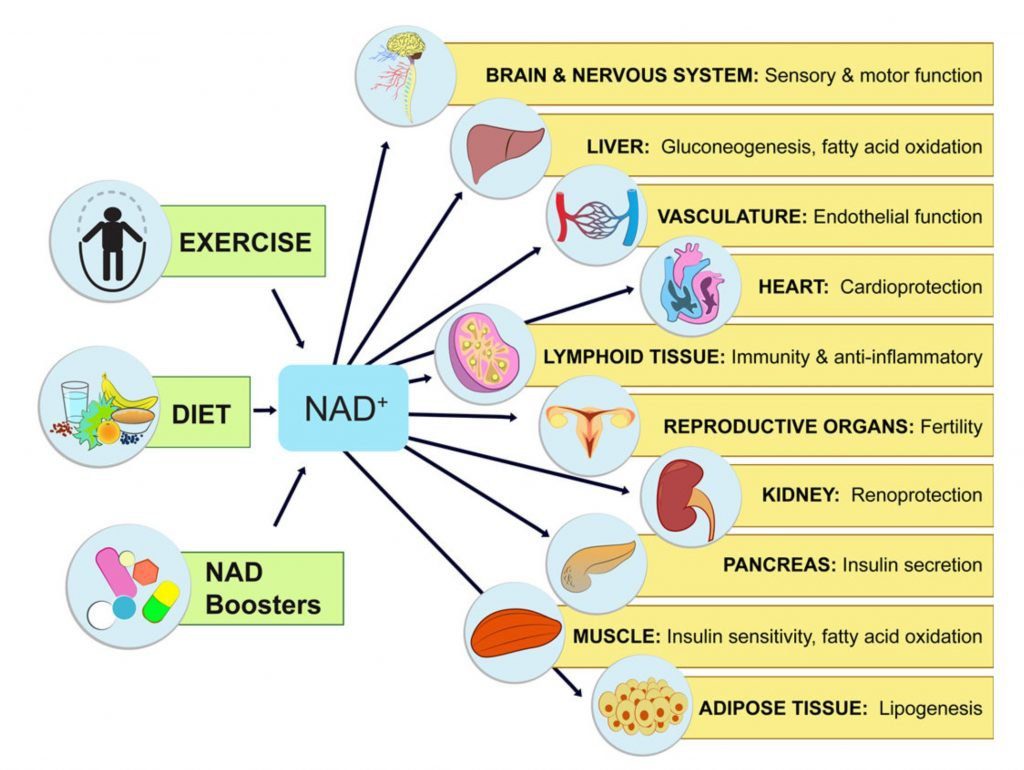
targeted supplementation
We will go into longevity supplementation in more depth at our second BIG REWIND workshop “What we can do to slow aging” with Dr. Rahul Kapur on Saturday, November 12, 2022, but in the meantime here are some of the latest research on longevity supplements.
Dr. David Sinclair, a professor at Harvard University, has been researching the role of sirtuins in aging.
Sirtuins are proteins that repair DNA damage, maintain the epigenome, and determine which genes are switched on or off.
We know this is important because during aging, DNA repair mechanisms go down, and the epigenome becomes more dysregulated.
Sirtuins like resveratrol, pterostilbene, nicotinamide (NR), and nicotinamide mononucleotide (NMN) have been linked to improved DNA and epigenomic stability and anti-aging.
NMN seems to be the most promising of these.
That’s because NMN is converted into NAD+, which is a cofactor of sirtuins and other DNA-repairing molecules.
What is NAD+?
NAD+ (nicotinamide adenine dinucleotide) is an important co-enzyme found in all cells. NAD+ is a substance that countless enzymes and proteins need to carry out their function and proper repair and maintenance of our DNA and epigenome.
NAD+ works with proteins to preserve health — particularly under conditions of hormetic stress — (ie. fasting, exercise, etc).
Unfortunately, NAD+ naturally decreases with age, even if we eat right and exercise, so that’s where targeted supplementation may make sense.
It is believed that by boosting NAD+ back to youthful levels, we can improve physiological function and possibly prevent the risk for age-related diseases.
Low levels of NAD+ are associated with:
- A decline in metabolism, leading to weight gain and an increased risk of type 2 diabetes, metabolic syndrome, fatty liver, and other metabolic disorders
- Fatigue
- Reduced blood vessel health
- Age-related muscle loss
- Aging-related cognitive decline
- Aging-related eyesight and hearing loss
- Shorter lifespan
What boosts NAD+ levels?
NAD boosters include sirtuins NR (a form of vitamin B-3, called nicotinamide riboside, NMN (nicotinamide mononucleotide), resveratrol, fisetin, and quercetin, but this blog will focus on NMN, one of the most popular substances researched to slow down aging.
NMN is a substance that occurs naturally in our bodies.
NMN is a precursor to NAD+, and we already know NAD+ is a very important molecule for every cell in our body.
The Benefits of NMN Supplementation
1. NMN increases energy levels.
Often, people report they have more energy when they take NMN.
To achieve a boost in energy, it’s advisable to take a sufficiently high dose.
Some people already feel an effect with 250 mg of NMN, while others have to take at least 500 mg.
2. NMN improves memory
Many users of NMN experience improvements in cognitive function, making them feel sharper or better able to concentrate.
3. NMN & healthier blood vessels.
Studies show that NMN rejuvenates aged blood vessels.
NMN considerably improves, for example, vascular elasticity in old animals.
4. NMN improves metabolism.
This is very important because during aging metabolism declines considerably, leading to an increased risk of many diseases.
5. NMN improves aging-associated decline.
When we get older, many things deteriorate our eyesight, stamina, energy levels, bone density, and immune function. All these improve according to studies in old mice.
6. NMN improves fertility.
Some people who take NMN report that they have an increase in libido. Biotech companies have discovered that NMN and NMN derivatives can make old animals fertile again.
7. NMN improves stem cell health.
During aging, stem cells decline, and the remaining stem cells often become dysfunctional. This contributes to aging, given stem cells generate new cells and maintain our tissues. Various studies show that NMN, or boosting NAD levels, can improve stem cell health and self-renewal.
8. NMN repairs DNA damage.
NMN helps cells to repair their damaged DNA. DNA damage is one of the reasons why we get older.
Scientists believe taking 250 to 500 mg of NMN per day is sufficient to benefit from NMN’s health and longevity-promoting effects, but always consult with your health care provider before embarking on any supplementation program.
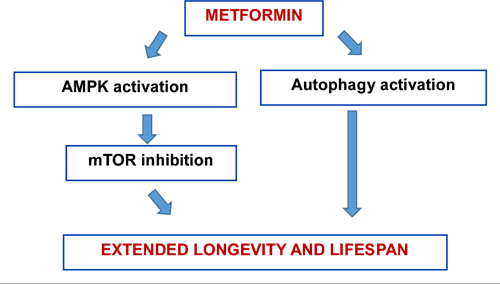
Metformin
Metformin is a prescription drug that has been used for decades to treat type 2 diabetes. The older we get, the more insulin resistant our tissues become.
The more insulin resistant you are, the less well your tissues can process sugars. The sugar is not taken up well into cells, and lingers around in the body, causing damage. For example, sugar creates cross-links, which we know contribute to aging.
This is accelerated when one eats unhealthily and/or is overweight.
Metformin and Longevity
Longevity scientists are unraveling how metformin works to help slow aging. It appears it has the following functions:
- Increasing AMPK levels. (AMPK is a protein that has many healthy effects on metabolism, inflammation, and aging in general.)
- Inhibiting important proteins in the mitochondria. This leads to more mitochondria being created, and the mitochondria protecting/repairing themselves better.
- Metformin could also alter the gut microbiome (the bacteria in our gut), which could be responsible for some of the health benefits.
- Researchers found that diabetics who take metformin in fact live longer than healthy persons who don’t take metformin. This is interesting, given people with diabetes live shorter lives on average than healthy, non-diabetics.
However, there are also some issues to keep in mind when taking metformin, including unfavorable “unknowns” and side effects.
Let’s start with the unknowns.
- Some studies showed that metformin could actually undo some of the beneficial effects of exercise.
- Metformin works as a strong mitochondrial “toxin” or inhibitor, stressing the mitochondria. A bit of stress can be good given it upregulates defense and repair mechanisms in the mitochondria – this process is called “mitohormesis” But when does “a bit” of stress become too much stress?
- A study showed that metformin treatment late in life could actually shorten lifespan. It could be that in very old people (of which the mitochondria are already significantly damaged or stressed), or that in middle-aged people who exercise (which also stresses the mitochondria, accounting for many of the health benefits of exercise) and also take metformin, that the metformin taxes the already stressed mitochondria too much.
That’s why, for example, Harvard Professor and aging expert David Sinclair does not take metformin on days he exercises.
- Metformin mainly improves mitochondrial health or metabolism in general. However, we age because of many other mechanisms, like epigenetic alterations, protein accumulation, telomere shortening, DNA damage, and so on. These aging mechanisms also need to be addressed, via other molecules than metformin.
- Metformin works greatly in diabetics, but it remains to be seen if metformin also brings about health or longevity benefits in healthy, non-diabetic people.
Side effects of metformin
- Metformin can reduce the body’s uptake of vitamin B12. Therefore, it is advised to take vitamin B12 (and ideally a B vitamin complex containing all B vitamins) when taking metformin.
- Abdominal discomfort, like diarrhea, gas, abdominal pain, and nausea. Often, the gastrointestinal discomfort subsides after a few weeks.
While metformin is a popular anti-aging supplement, the jury is still out on its appropriate use and dosage.
In studies comparing the efficacy of Metformin vs lifestyle changes in diet and exercise, lifestyle proved to have 50% more impact than Metformin.
Supplementation is always a discussion to have with your health care provider.

summary
Aging is influenced by many factors including how we eat, how much we eat, and when we eat.
Exercise, sleep habits, exposure to toxins, and feeling connected and supported all factor into the rate of our biological aging.
The good news is that we know we can positively impact our longevity via lifestyle choices.
Intermittent fasting, hypoxic exercise, (HIIT and strength training), and prioritizing sleep and recovery are all important epigenetic triggers to slow aging.
Consuming an anti-inflammatory Mediterranean diet, reducing animal protein consumption, limiting alcohol, staying hydrated, and restricting eating to a few hours a day are all ways we can slow the aging process.
In our second workshop with Dr. Rahul Kapur on November 12, 2022, we’ll take a deeper dive into other anti-aging protocols.
Cryotherapy, sauna, hyperbaric and ozone therapies, peptides, stem cells, and safe options for targeted supplementation are all topics on the agenda.
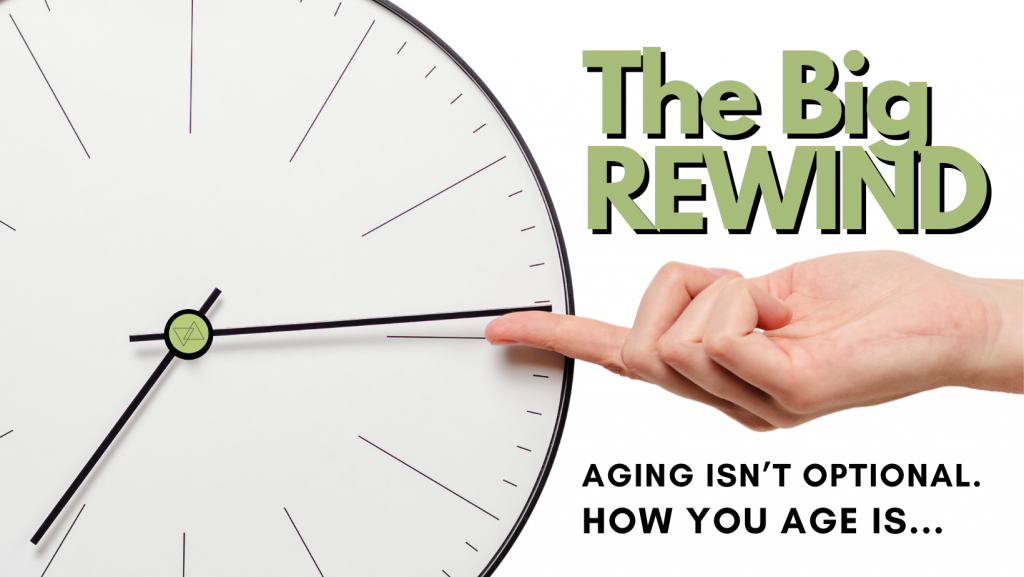
The mechanism of aging all boils down to keeping our mitochondria and DNA clean, healthy, and functional.
In addition to eating healthy, moving regularly, and staying connected in your community, new scientific discoveries in longevity can help us not only live longer but better, healthier, and with more joy!
Join Tina Sprikle for THE BIG REWIND, a 3-part series exploring the reasons why we age and what we can do about it.
All workshops take place in-person from 2:00-3:30 pm at Centered Spirit located at 8131 Wornall Road, Kansas City, Mo. 64114. We will film each session for replay later should you have to miss the live event.
Single Workshop: $45
All three workshops: $69

@ Centered Spirit
8131 Wornall Road
Kansas City, Mo 64114
workshop #1.
why we age
SATURDAY, OCTOBER 22, 2022 2:00-3:30 pm
Take a deep dive into the biochemistry of aging, and longevity science, to learn how you can not only live longer but live better!

@ Centered Spirit
8131 Wornall Road
Kansas City, Mo 64114
workshop#2.
what we can do
Saturday, November 12, 2022 2:00-3:30 pm
The importance of nutrition, meal timing, exercise, and targeted supplementation and peptide therapy for slowing down and reversing aging with special guest Dr. Rahul Kapur

@ Centered Spirit
8131 Wornall Road
Kansas City, Mo 64114
workshop #3. ask the surgeon
Saturday, January 14, 2023 2:00-3:30 pm
You’re eating right, exercising and working your anti-aging protocol but still want a fresher face in the mirror. Join special guest Dr. Regina Nouhan as she answers your questions about options for facial cosmetic surgery.
Each 90-minute workshop provides participants with:
- The latest longevity research education
- Actionable steps to improve your health, slow and or reverse aging
- Workshop handout and Ebook
- Resources links and service providers
- Video replay
- Optional follow-up resource texts
until we get this party started why we age - 10.22.2022
Questions?
I’m always a text or email away.
Email me at tina@tinasprinkle.com or send me a text at 913 963 8546.

